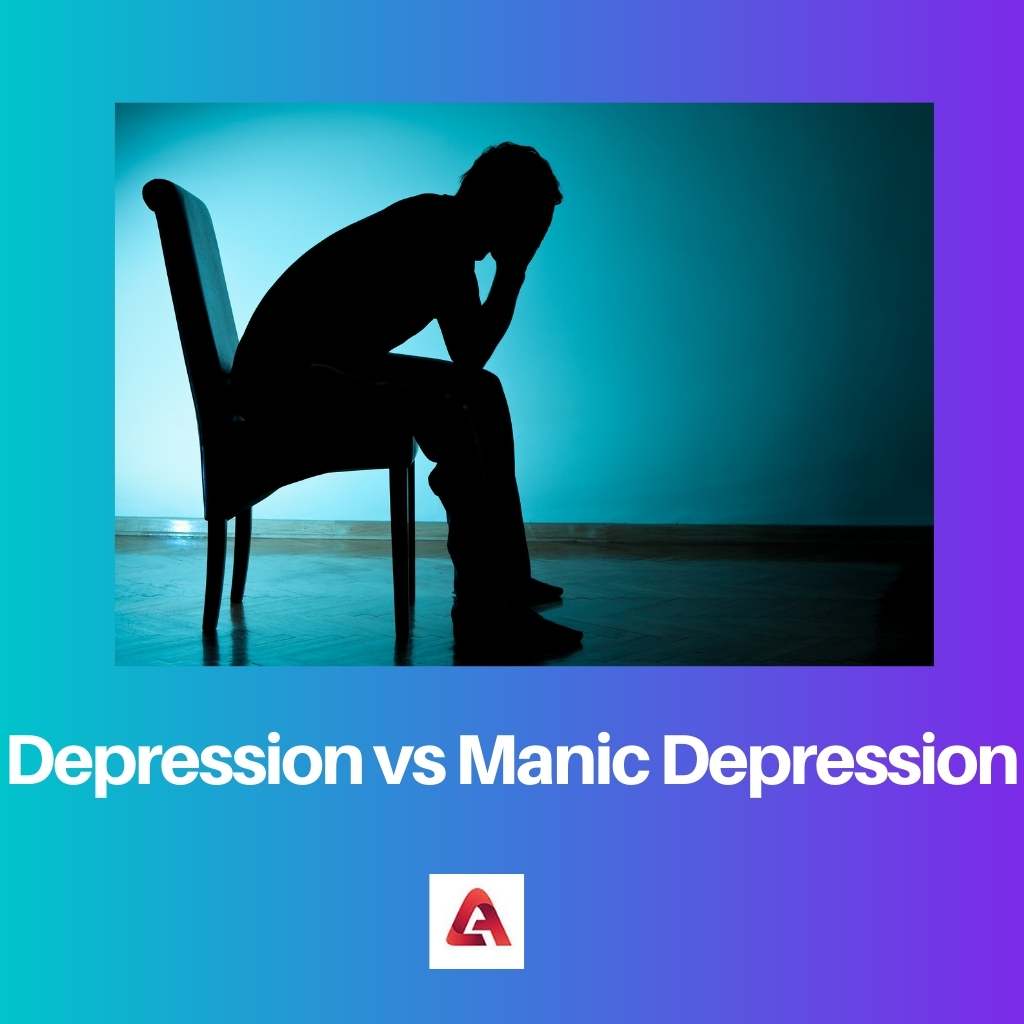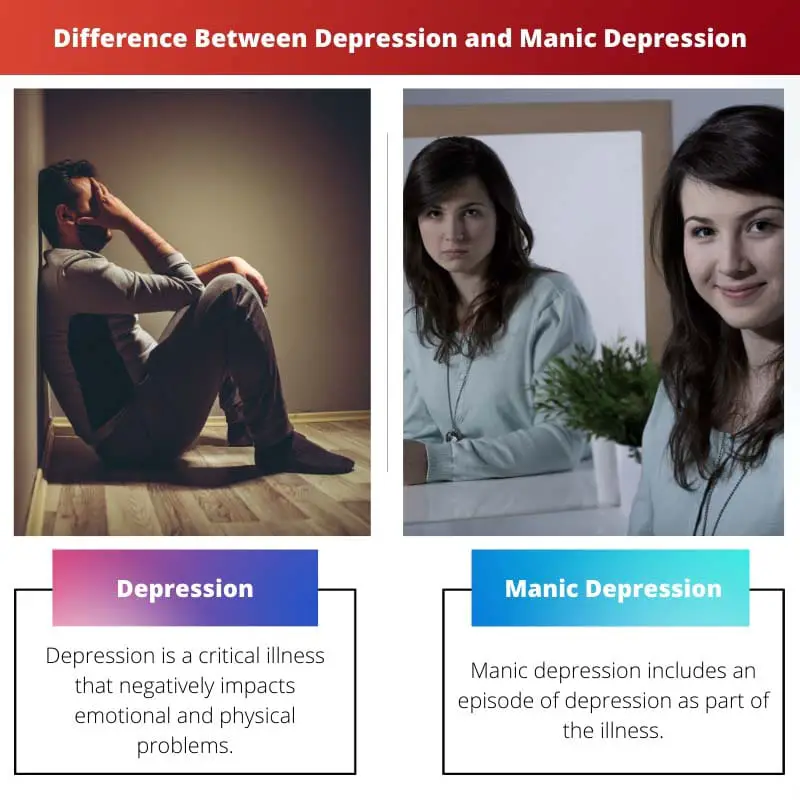Mental health is really important as it affects physical health as well as mental health. Many people
depression which is a very serious illness. But, people tend to neglect the noticeable symptoms and signs.
So, when it is neglected, it shows negative effects on the health of the person.
Moreover, it results in depressive episodes or rollercoaster rides of emotions, such as feelings of sadness, loss of interest, and several emotional and physical problems.
Key Takeaways
- Depression involves persistent sadness, loss of interest, and hopelessness, while manic depression includes periods of mania or hypomania characterized by intense energy, euphoria, and impulsivity.
- Manic depression, also known as bipolar disorder, alternates between depressive and manic episodes, whereas depression do not have manic phases.
- Treatment for depression may include antidepressants and therapy, while manic depression requires mood stabilizers, antipsychotics, and therapy.
Depression vs Manic Depression
The difference between depression and manic depression is that depression is a critical illness that negatively impacts emotional and physical problems. In contrast, manic depression includes an episode of depression as part of the illness. Secondly, Depression shows feelings of sadness, while maniac depression shows feelings of being overly happy or excited. Thirdly, Depression doesn’t have uncontrollable thoughts or speech, while manic depression may lead to uncontrollable thoughts or speech. Fourthly, Depression doesn’t lead to self-centeredness, while manic depression leads to self-centeredness, such as thinking highly of yourself. Lastly, depression doesn’t engage with risky behaviour to an extreme extent. In contrast, manic depression may engage in high-risk behaviour.

Depression is a serious illness that negatively impacts emotional and physical health. A patient may show feelings of sadness, loss of interest, crying, feeling worthless, etc.
Although, depression doesn’t associate with uncontrollable thoughts or speech, feelings of over-happiness, and excitement.
Additionally, it doesn’t associate with self-centredness and engages in risky behaviour to an extreme extent.
Manic depression is a serious illness, also known as bipolar disorder. A patient may show feelings of being overly happy or excited, etc.
Although, manic depression is associated with uncontrollable thoughts or speech, feelings of over-happiness, and excitement.
Additionally, it does associate with self-centredness, such as thinking highly of yourself and engaging in risky behaviour to an extreme extent.
Comparison Table
| Parameters of Comparison | Depression | Manic Depression |
|---|---|---|
| Definition | Depression is a critical illness that negatively impacts emotional and physical problems. | Manic depression includes an episode of depression as part of the illness. |
| Feelings | Depression shows feelings of sadness. | Manic depression shows feelings of being overly happy or excited. |
| Uncontrollable thoughts or speech | Depression doesn’t have uncontrollable thoughts or speech. | Manic depression may lead to uncontrollable thoughts or speech. |
| Self-centeredness | Depression doesn’t lead to self-centeredness. | Manic depression leads to self-centeredness, such as thinking highly of yourself. |
| Risky behavior | Depression doesn’t engage with risky behavior to an extreme extent. | Manic depression may engage in high-risk behavior. |
What is Depression?
Mental health is important for every human being, as depression harms the person’s health. It leads to an impact on emotional and physical health.
There are many disorder and illness that has depression as a common complication.
Depression is a serious illness that can be caused due to many factors, such as trauma, sudden change, environment, etc.
However, it is curable, but if left treated, it can be harmful. Also, it impacts the functionality of a person at home or work.
A patient may show feelings of sadness, loss of interest, crying, feeling worthless, etc. Although, depression doesn’t associate with uncontrollable thoughts or speech, feelings of over-happiness, and excitement.
Additionally, it doesn’t associate with self-centredness and engages in risky behaviour to an extreme extent.
As for the symptoms, they can be mild to severe, such as feeling sad, depressed mood, loss of interest, change in appetite, trouble sleeping, fatigue, feeling worthless or guilty, and thoughts of death or suicide.
Symptoms can last for longer than expected. It may last from two weeks to months, but it should change when it is being treated.
Risk Factors of depression are biochemistry, genetics, personality, and environmental factors. Moreover, the treatment includes medications as well as counselling.

What is Manic Depression?
Mental health is important for every human being. Manic depression can be really dangerous as it forces a person to go to a further extent.
Manic depression is a serious illness that can be caused due to many factors, such as trauma, sudden change, environment, etc. However, it is curable, but if left treated, it can be harmful to herself or others.
Also, it impacts the functionality of a person at home or work. It is also known as bipolar disorder.
A patient may show feelings of sadness, loss of interest, crying, feeling worthless, etc.
Although, manic depression is associated with uncontrollable thoughts or speech, feelings of over-happiness, and excitement.
Additionally, it is associated with self-centredness and engages in risky behaviour to an extreme extent. The symptom can be mild, as there are types of bipolar disorder.
As for the symptoms, they can be mild to severe, such as over-happiness, over-excitement, extreme irritability, highly aggressive, uncontrolled thoughts or speech, self-centeredness, poor judgment, and engaging in risky behaviour to an extreme extent.
Symptoms can last for longer than expected. It may last from 7 days to months, but it should change when it is being treated.
Risk Factors of manic depression are biochemistry, genetics, personality, and environmental factors. Moreover, the treatment includes medications as well as counselling.

Main Differences Between Depression and Manic Depression
Depression and Manic depression is a serious illnesses that doctors must diagnose and treat. Although depression and manic depression have similar symptoms, thus it is difficult to tell them apart.
Manic depression has an episode of depression, thus many diagnoses are misinterpreted. But they’re very different from each other.
- Depression is a critical illness that negatively impacts emotional and physical problems. In contrast, manic depression includes an episode of depression as part of the illness.
- Depression shows feelings of sadness, while maniac depression shows feelings of being overly happy or excited.
- Depression doesn’t have uncontrollable thoughts or speech, while manic depression may lead to uncontrollable thoughts or speech.
- Depression doesn’t lead to self-centeredness, while manic depression leads to self-centeredness, such as thinking highly of yourself.
- Depression doesn’t engage with risky behaviour to an extreme extent. In contrast, manic depression may engage in high-risk behaviour.

- https://bpspsychub.onlinelibrary.wiley.com/doi/abs/10.1111/j.2044-8341.1998.tb00999.x
- https://www.thelancet.com/article/S0140-6736(18)31948-2/abstract

I don’t think this here is misleading because of the contrast between these two illnesses, which is useful. I wouldn’t say doctors diagnose this accurately often enough.
It’s scary to think about how serious these things can be. The mind is such a complicated place.
Okay, but the thing is, we don’t have to treat the illness as a ‘cure.’ Some people live their life for art or music. Some people change the world out of their grief. That’s worth something.
Interesting how biochemical factors can contribute. It’s almost like depression is ‘invisible’ but it’s really not. It’s a fascinating contrast.
Depression is such a complicated subject. It’s hard to distinguish when being ‘sad’ turns into an illness. At least we are getting to know more every day.
Genetics and environment are two risk factors that most people don’t think about when it comes to these things. It’s important to communicate these ideas more.